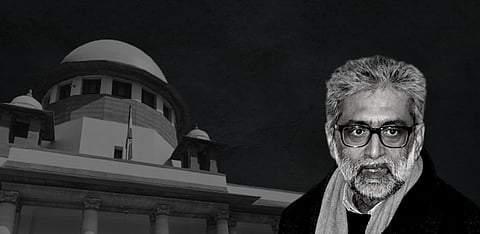

Withdrawing the application that sought his transfer from Mumbai to Delhi, Navlakha will now seek another place in Mumbai.
—
ON Friday, a division bench of the Supreme Court, comprising Justices K.M. Joseph and B.V. Nagarathna, allowed the withdrawal of the application filed by Gautam Navlakha for the transfer of his place of house arrest from Mumbai to Delhi.
Journalist and human rights activist Navlakha, an accused in the Bhima Koregaon-Elgar Parishad Maoist links/criminal conspiracy case, is charged under the Unlawful Activities (Prevention) Act, 1967. During his custody as an undertrial prisoner, a charge sheet was filed on October 9, 2020; charges are yet to be filed by the court. The petitioner, in custody since April 2020, stands accused along with 15 others. He had been lodged at Taloja Central Jail in Mumbai, awaiting trial.
Senior advocate Nitya Ramakrishnan, representing Navlakha, flagged the difficulties of staying at the current space where he is under house arrest in Mumbai. The application prayed to allow Navlakha to find accommodation for house arrest in Delhi.
Solicitor General of India, Tushar Mehta, appearing for the National Investigation Authority (NIA), opposed the application. Justice Joseph remarked that when the terms of house arrest were drawn, the petitioner should have been aware of the situation in Mumbai before agreeing to the placement.
Subsequently, Ramakrishnan withdrew the application and sought time to search for an alternative place in Mumbai.
On November 10 last year, another division bench of the court comprising Justices Joseph and Hrishikesh Roy allowed Navlakha to be placed under house arrest for a period of one month under certain restrictions. On November 19, after hearing and incorporating further concerns of the NIA, the bench dismissed the petition filed by the NIA to vacate the order granting house arrest and directed the house arrest order to be implemented within 24 hours of its pronouncement.
Since then, his house arrest has been periodically extended by the court.
Navlakha was arrested on August 28, 2018, for his alleged involvement in the Elgar Parishad-Maoists links case. While he was initially kept under house arrest, he was subsequently sent to judicial custody in April 2020.
In May 2021, the Supreme Court rejected Navlakha's default bail on the ground that the 35 days he spent under house arrest in 2018 did not constitute custody in order to compute the 90-day period within which a charge sheet must be filed under criminal law, to entitle him to the same. On October 12, 2021, Navlakha was shifted to the 'anda circle' (high-security zone) from the barracks at Taloja, further deteriorating his health, as claimed by his partner, Sahba Hussain.
On April 26 last year, the Bombay High Court dismissed Navlakha's petition that sought his transfer from the Taloja jail in Navi Mumbai to house arrest. On May 23, Navlakha approached the NIA to be provided with a mosquito net, which he was previously allowed but was subsequently taken away by the prison authorities. Earlier, prison authorities had refused his request for a new pair of spectacles, which were given only after media and legal intervention.
The Maharashtra prison authority has also barred Navlakha from availing telephonic communication facilities in Taloja, as per a circular signed by the state's Inspector General of Police that provides that undertrial prisoners booked for charges of terrorism or other "serious charges" cannot make telephone calls from the prison.
The prosecution in the case has filed a chargesheet exceeding 5,000 pages and intends to cross-examine at least 200 witnesses. Thirteen of the 16 accused persons are presently incarcerated, having now spent between two to well over four years in judicial custody without trial. Another accused, tribal rights activist and Jesuit priest Fr. Stan Swamy, passed away in judicial custody in July 2021 after contracting COVID-19 in prison while awaiting bail on medical grounds.